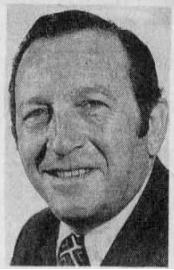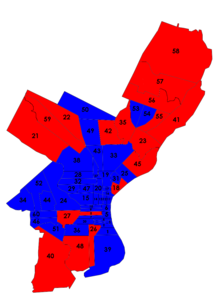
Richardson K. Dilworth was an American Democratic Party politician who served as the 91st mayor of Philadelphia from 1956 to 1962. He twice ran as the Democratic nominee for governor of Pennsylvania, in 1950 and in 1962. He is to date the last White Anglo-Saxon Protestant mayor of Philadelphia.

Harry Norwitch was an organized labor leader and Democratic politician from Philadelphia.

The 1951 Philadelphia municipal election, held on Tuesday, November 6, was the first election under the city's new charter, which had been approved by the voters in April, and the first Democratic victory in the city in more than a half-century. The positions contested were those of mayor and district attorney, and all seventeen city council seats. There was also a referendum on whether to consolidate the city and county governments. Citywide, the Democrats took majorities of over 100,000 votes, breaking a 67-year Republican hold on city government. Joseph S. Clark Jr. and Richardson Dilworth, two of the main movers for the charter reform, were elected mayor and district attorney, respectively. Led by local party chairman James A. Finnegan, the Democrats also took fourteen of seventeen city council seats, and all of the citywide offices on the ballot. A referendum on city-county consolidation passed by a wide margin. The election marked the beginning of Democratic dominance of Philadelphia city politics, which continues today.

The 1955 Philadelphia municipal election, held on Tuesday, November 8, involved contests for mayor, district attorney, all seventeen city council seats, among other offices. Citywide, the Democrats took majorities of over 130,000 votes, continuing their success from the elections four years earlier. Richardson Dilworth, who had been elected district attorney in 1951, was elected mayor. Victor H. Blanc, a city councilman, was elected district attorney. The Democrats also kept fourteen of seventeen city council seats, losing one district seat while gaining another, and kept control of the other citywide offices. The election represented a further consolidation of control by the Democrats after their citywide victories of four years earlier.

Philadelphia's municipal election of November 3, 1953, was the second held under the city charter of 1951 and represented the first test of the Democratic city government of Mayor Joseph S. Clark Jr. In the 1951 election, the voters had elected a Democratic mayor for the first time in 67 years, breaking the Republican hold on political power in the city. They had also elected a majority-Democratic City Council along with Democrats for district attorney and other citywide offices. In 1953, the voters had the chance to continue the Democratic trend or to block it in the election for City Controller, Register of Wills, and various judges and magistrates. On election day, the Republican organization recovered from their 1951 losses, electing all their candidates citywide. Republicans celebrated the victory, but subsequent Democratic triumphs in the 1955 and 1959 elections made the 1953 result more of an aberration than a true comeback for the once-powerful Philadelphia Republican machine.

The 1957 Philadelphia municipal election, held on November 5, involved the election of the district attorney, city controller, and the remainder of a term for one city council seat, as well as several row offices and judgeships. Democrats were successful citywide, continuing a run of victories racked up after the passage of a new city charter in 1951 despite growing divisions between factions of the party. Victor H. Blanc, the incumbent district attorney, led the Democratic ticket to victory. They held the city council seat and took two citywide offices that Republicans had won in 1953. In the judges' elections, most were endorsed by both parties but in the one race that pitted a Democratic candidate against a Republican, the Democrats were successful in seating their candidate, former Congressman Earl Chudoff.
Joseph Lorenz Kun was a Philadelphia lawyer and judge who served for thirty years on the Philadelphia Court of Common Pleas.

1959 Philadelphia's municipal election, held on November 3, involved contests for mayor, all seventeen city council seats, and several other executive and judicial offices. Citywide, the Democrats took majorities of over 200,000 votes, continuing their success from the elections four years earlier. Richardson Dilworth, who had been elected mayor in 1955, was re-elected over Republican nominee Harold Stassen. The Democrats also took fifteen of seventeen city council seats, the most seats allowed to any one party under the 1951 city charter. They further kept control of the other citywide offices. The election represented a continued consolidation of control by the Democrats after their citywide victories of the previous eight years.

Maurice S. Osser was a Democratic politician from Philadelphia who served as City Commissioner.

Henry Washington Sawyer III was an American lawyer, civil rights activist and politician. Born in Philadelphia, he served in the U.S. Navy in World War II, afterwards returning to the University of Pennsylvania Law School. Sawyer worked as a corporate lawyer but is best known for his advocacy of civil liberties, especially in First Amendment cases. In Abington School District v. Schempp and Lemon v. Kurtzman, he successfully argued cases on behalf of the American Civil Liberties Union before the Supreme Court of the United States that became the basis for all modern Establishment Clause jurisprudence. Sawyer also pursued civil rights causes in Philadelphia and in the South during the civil rights movement of the 1960s. Originally a Republican, he was elected as a Democrat to serve a four-year term on the Philadelphia City Council, where he worked for civil service reform and to increase the amount of public art in the city.

Gaetano Paul "Tommy" Giordano Sr. was a Philadelphia businessman who served three terms on the Philadelphia City Council as a Democrat.

The 1960 Philadelphia City Council special election was held to fill two vacant city council seats. The first was in the 4th district, when Democrat Samuel Rose died in January 1960. A second vacancy that same year occurred in the 6th district when Democrat Michael J. Towey died suddenly in September 29. Special elections were scheduled for November 8, 1960, to be held at the same time as the national election that year. Both seats were easily held by the Democratic Party.

William Aloysius Dwyer Jr. was an American lawyer, judge, and Democratic politician from Philadelphia. He served on the Philadelphia City Council from 1960 to 1963 and on the Pennsylvania Court of Common Pleas from 1967 until his death in 1982.

Alexander Hemphill was a Democratic lawyer and politician from Philadelphia who served as City Controller from 1958 to 1968. After service in World War II and graduation from the University of Pennsylvania Law School, Hemphill embarked on a legal career before running for office. In his three terms as city controller, he exposed corruption and malfeasance, often to the discomfort of his fellow Democrats. He ran for mayor of Philadelphia in 1967 against the incumbent Democrat, James Tate, but was unsuccessful, and retired to a private law practice until his death in 1986.

Foster Alexander Dunlap was a Republican lawyer and politician from Philadelphia who served as City Controller from 1954 to 1958.
Stanley Bartlett Smullen Jr. was a Philadelphia businessman who served briefly on the Philadelphia City Council as a Republican.

Philadelphia's City Council special election of 1962 was held to fill three vacant city council seats. The first was in the 8th district, when Democrat Alfred Leopold Luongo was appointed to the federal bench in September 1961. A second vacancy that same year occurred in the 10th district when Democrat John M. McDevitt resigned in June 1962 to become a Catholic priest. An at-large seat also became vacant when Victor E. Moore resigned in September 1962 to become the head of the Philadelphia Gas Works. Special elections were scheduled for November 6, 1962, to be held at the same time as the federal and gubernatorial elections that year. Democrats held two of the seats but lost the 8th district to a Republican.

The 1963 Philadelphia's municipal election, held on November 5, involved contests for mayor, all seventeen city council seats, and several other executive and judicial offices. The Democrats lost vote share citywide and the Republicans gained one seat in City Council, but the Democratic acting mayor, James Tate, was elected to a full term and his party maintained their hold on the city government. The election was the first decline in the Democrats' share of the vote since they took control of the city government in the 1951 elections, and showed the growing tension between the reformers and ward bosses within their party.

Austin Andrew Meehan, Sr., was a Republican politician in Philadelphia who served as county sheriff. Before entering politics, Meehan ran his family's paving business and was known as a local basketball star. Beginning as an insurgent within the city's Republican Party, he soon won the favor of party bosses and climbed the ranks of Philadelphia's Republican organization. Meehan served two terms as county sheriff from 1944 to 1952 and was recognized as the unofficial head of the Republican Party in Philadelphia in the 1950s. He remained an influential party member until his death in 1961. He was the father of Billy Meehan.

Joseph John Hersch was a Democratic politician from Philadelphia who served in the Pennsylvania House of Representatives and as a city magistrate before being elected to the Philadelphia City Council.















